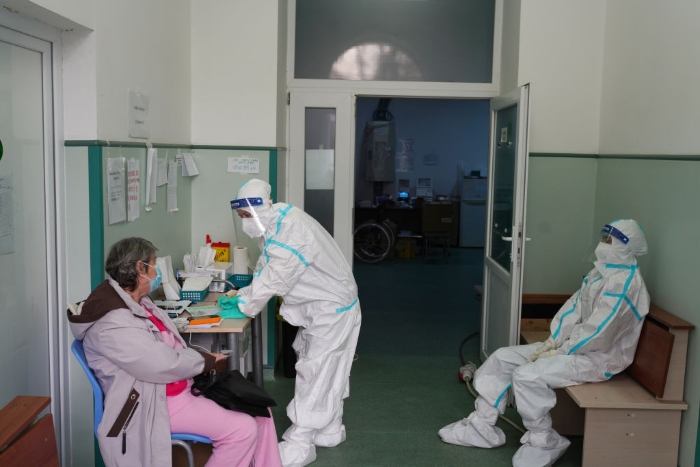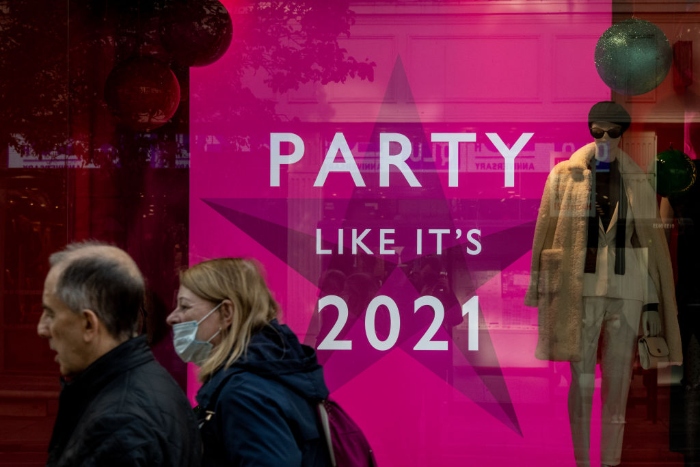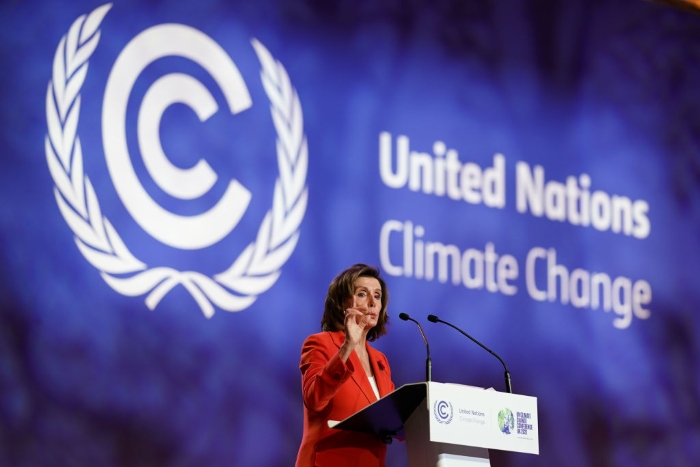| | |  | BY CARMEN PAUN AND MYAH WARD | | ALL PANDEMICS ARE GLOBAL — The U.S. reopened its borders to vaccinated international travelers this week, a sign the country feels comfortable enough to let down its guard at least a little. The end of the 20-month travel ban also arrived when Europe is once again the epicenter of the pandemic, a reminder that this is a global crisis — one that’s far from over. Even if the U.S. declares victory against Covid sometime soon, the virus will likely continue its dance around the globe through 2022 and beyond, Maria Van Kerkhove, the World Health Organization’s technical lead on Covid, told Nightly. “We live in a completely interconnected world that is opening up. … Any population that achieves high level of [vaccine] coverage, doesn’t mean that they’re completely safe,” Van Kerkhove said. “There’s a false sense of security, if you think a country can just protect itself at the expense of others.” Van Kerkhove is talking about vaccine inequity, one of the biggest drivers of Covid’s global spread. In Africa, Van Kerkhove describes vaccine access as “grossly unfair.” Even as the pace of shots begins to pick up, a global syringe shortage threatens the continent’s progress. Yet vaccine inequity alone, Van Kerkhove said, doesn’t explain why the virus is surging in Europe right now, where many countries are hitting record levels for new infections.
| 
Medical staff attend to a new Covid-19 patient at the Institute of Pneumophysiology Marius Nasta in Bucharest, Romania. | Andreea Campeanu/Getty Images | In many central and Eastern European countries, vaccine hesitancy — triggered by a lack of trust in the safety of the vaccines and in the governments promoting them — has led to overcrowded hospitals reminiscent of the early days of the pandemic in Italy. “Nine out of 10 patients in our intensive care unit die,” said Ivan Poromanski, head of one of the biggest medical facilities in Bulgaria’s capital of Sofia, Pirogov Hospital, which treats patients with severe Covid-19, Ashleigh Furlong reported for POLITICO Europe. Only 23 percent of Bulgaria’s nearly 7 million people are fully vaccinated, the lowest level in the European Union. From the Czech Republic to Georgia, countries are struggling with high numbers of infections and, in many cases, high hospitalization rates. Latvia , for example, needs to increase its hospital capacity in ways it didn’t need to do earlier in the pandemic, Catherine Smallwood, senior emergency officer at the WHO Europe region, which covers 53 countries spanning from Western Europe to Central Asia, told Nightly. Bulgaria’s neighbor to the north, Romania , the second least fully vaccinated EU country at 34 percent, has been transferring some very sick patients to Germany, Hungary and Poland because it ran out of intensive care beds. The disaster could be seen coming this summer, when the Romanian government was discussing ways to get more people immunized, but political infighting and a government collapse hampered any effort to prevent it. Russia is also seeing its worst Covid wave yet, with reports that the overall numbers of cases and deaths are underestimated. About one-third of Russia’s 146 million people are fully vaccinated. Russia rolled out its Sputnik V vaccine in the summer of 2020, before late-stage clinical trials were finalized, and boasted about having the first Covid-19 vaccine in the world. More than a year later, many people still don’t trust it enough to take it. But blaming everything on vaccine hesitancy can be simplistic, Smallwood said. In Russia, she questions whether family doctors were involved enough in the vaccine rollout. Welcome to POLITICO Nightly. Keep reading for a look at how more-vaccinated countries in Europe are struggling, too. Reach out with news, tips and ideas at nightly@politico.com. Or contact tonight’s authors at cpaun@politico.com and mward@politico.com, or on Twitter at @carmenpaun and @MyahWard.
| |
| | A message from Bank of America: What if where you were born inspired your life’s work? Hear how growing up in the rural South drove Catherine Coleman Flowers to become one of America’s top advocates for environmental justice. | | | | 
A shopper wearing a face mask walks past a Christmas window display at John Lewis, Oxford Street in London. | Chris J Ratcliffe/Getty Images | Even in places with high vaccination rates like the U.K. or Germany, where nearly 70 percent of the populations are fully vaccinated, cases are once again spiking. Vaccines have effectively decreased severe disease and deaths in vaccinated countries, Van Kerkhove said, but transmission is rising as governments abandon public health measures like masking and social distancing. Additional factors like winter weather driving people indoors and increased social mobility are driving the spread. Now some restrictions are being reintroduced. “And that is the most unpopular decision that has to be made now because people are so tired of it,” said Andrea Ammon, the director of the European Centre for Disease Prevention and Control. Denmark, where a full vaccination rate in the high 70s led the government to abandon mask wearing and other measures in September, is considering reintroducing a demand for proof of vaccination or a negative Covid test to access bars and restaurants. There’s no consensus about the vaccination rate necessary to put the pandemic behind us, but it has to be more than the 65 percent of the overall population the EU has at the moment, Ammon said. Vaccines or no vaccines, the virus will continue to mutate. In the European Union, Delta accounts for almost all cases of infection, she said. The so-called Delta Plus variant hasn’t started making inroads into the EU after being reported in neighboring U.K., Ammon said. The variant is only slightly more transmissible than the original Delta variant, WHO Europe’s Smallwood said. “But it’s a signal that Delta will continue to evolve.” There are other, deceiving parts of the global map that only appear to be in better shape than Europe. If you look at Ethiopia on the New York Time’s global Covid tracker, you’ll see fewer than 300 average daily cases. This number is likely much higher, Amira Roess, a professor of global health and epidemiology at George Mason University, said of the country spiraling into civil war. Civil unrest will continue to fuel the spread of pathogens as populations face overcrowding, unhygienic living conditions, low quality nutrition, and poor sanitation and health care, Roess said. The same story is playing out in the opposition-led Northeast area of Syria. The region is going through its worst pandemic wave yet, with a four-fold increase in cases compared to the previous wave, said Chenery Ann Lim, a medical coordinator in the region for the international medical nonprofit Doctors Without Borders. And that’s an underestimation, as there’s been a shortage of testing supplies, she said. Even so, almost 1 in 4 people that get tested now turn out positive, down from 5 or 6 for every 10 people tested in recent weeks. Less than 2 percent of the 4 million people living in the region, some crowding in tents after being displaced by Syria’s long civil war, have been fully vaccinated against Covid.
| |
| | DON’T MISS POLITICO’S SUSTAINABILITY SUMMIT: Join POLITICO's Sustainability Summit on Tuesday, Nov. 16 and hear leading voices from Washington, state houses, city halls, civil society and corporate America discuss the most viable policy and political solutions that balance economic, environmental and social interests. REGISTER HERE. | | | | | | | — Top GOP recruit Sununu won’t run for Senate: New Hampshire Gov. Chris Sununu said today he won’t run for Senate — spurning national Republicans who clamored for him to challenge Democratic Sen. Maggie Hassan. Instead, Sununu will run for reelection, he said. “I’m going to run for a fourth term,” Sununu said during a Concord press conference. “We have a lot more to do to protect the interests of New Hampshire citizens, and it’s just clear that I can be most effective doing that here in the corner office in the Granite State.” — Newsom: I skipped climate summit after kids ‘had an intervention’: Gov. Gavin Newsom offered an explanation today for why he abruptly dropped his plans to attend the U.N. climate conference in Scotland: His children staged “an intervention” and begged him to remain home for Halloween. Newsom addressed the topic in his first official public appearance since late October and as speculation about his unusually low profile grew increasingly intense. He said he had been “on this damn treadmill,” grappling with natural disasters, beating back a recall campaign and then choosing whether to sign or veto hundreds of bills ahead of his planned departure for Scotland. — Watchdog: 13 Trump officials violated Hatch Act during 2020 campaign: More than a dozen top Trump administration officials violated the terms of the Hatch Act in the run-up to the 2020 elections , the U.S. Office of Special Counsel said in a report released today. The list includes several cabinet officials and top White House aides, including Trump’s former Secretary of State Mike Pompeo, chief of staff Mark Meadows and press secretary Kayleigh McEnany.
| |
| | A message from Bank of America:  
| | | — Jan. 6 panel demands testimony from Stephen Miller, Kayleigh McEnany: Former Trump adviser Stephen Miller, White House personnel director Johnny McEntee and press secretary Kayleigh McEnany are among a new batch of senior Trump White House aides subpoenaed today by the House’s Jan. 6 select committee. Investigators are accelerating their efforts to compel testimony from key Donald Trump aides who had visibility into the chaotic final weeks of his presidency, as he worked feverishly to overturn the results of the election. — Facebook places new restrictions on ad targeting: Meta, the parent company of Facebook, announced today that it would place further limits on ad targeting on its platform, eliminating the ability to target based on users’ interactions with content related to health, race and ethnicity, political affiliation, religion and sexual orientation. The changes will go into effect on Jan. 19, 2022, when it will no longer allow new ads to use those additional targeting tools. The change will be fully implemented by March 17, 2022, at which point ads that were already running using those targets will no longer be allowed.
| | | 
House Speaker Nancy Pelosi speaks on stage during COP26 in Glasgow, Scotland. | Ian Forsyth/Getty Images | COP 26 CALLS FOR CASH GROW — Rich countries are being put on the spot at the COP26 climate summit as poorer nations — facing floods, fires, droughts and sea-level rise caused by global warming — ramp up calls for compensation. Countries vulnerable to climate change have pushed for decades to get the issue of “loss and damage” — the social and economic costs of global warming — on the agenda at U.N. talks, Zia Weise writes. Rich nations, historically responsible for the bulk of planet-warming emissions, have resisted, fearing that any commitments could amount to accepting legal liability and open the door to massive claims for compensation. But with extreme weather events occurring with ever greater frequency and ferocity and rich countries breaking past promises of financial support, loss and damage funding is turning into a key part of this week’s negotiations in Glasgow. “Those of you who have followed this process will know that loss and damage has historically been seen as a polarizing issue,” COP26 President Alok Sharma told reporters on Monday. “But I’m encouraged that the mood music has changed somewhat, and there is now a practical recognition that action is needed on this topic in the face of growing [climate] impacts.”
| |
| | BECOME A GLOBAL INSIDER: The world is more connected than ever. It has never been more essential to identify, unpack and analyze important news, trends and decisions shaping our future — and we’ve got you covered! Every Monday, Wednesday and Friday, Global Insider author Ryan Heath navigates the global news maze and connects you to power players and events changing our world. Don’t miss out on this influential global community. Subscribe now. | | | | | | | | |
| | | ‘IT’S THE PARENTS, STUPID’ — Michael Kruse writes in POLITICO Magazine: Glenn Youngkin’s surprising gubernatorial victory over Terry McAuliffe, fueled by pandemic-era, schools- and education-related angst that went well beyond the dog-whistle buzzword of “critical race theory,” constituted a kind of parents’ revolt. With a winning mix of rural, still-ginned-up Trump devotees coupled with people in suburbs who had voted for Joe Biden all of 12 months back, it highlighted, even in this rigidly partisan time, the possibility of a pocket of more dynamic political terrain, unlikely alliances and scrambled electoral math. And it augured GOP strategy to come heading into next year’s midterms and even 2024 by spotlighting a potentially new Covid-created key constituency — fed-up moms and dads. It’s easy to say now, but you could see this coming. Out and about, all year long, the hub of the most visceral political action was schools. The squabbles over “CRT” got the most attention, but that fixation, it seems, clouded the broader constellation of concerns, so consistent and pervasive the essential sentiment in retrospect was strangely tough to process in full. In my own neighborhood, the rough North Carolina equivalent of Rory Cooper’s in Virginia, this fall I, too, started to feel people at polar ends of the political spectrum inching closer and closer together on specific, schools-centric issues like masks. Their shared thoughts distilled: When can our kids take them off, especially as more and more of them get vaccinated? Because what they’re giving up is not now, and arguably never has been, commensurate with the risk they’re taking on. People who don’t talk politics, or who recently haven’t talked much at all, period, because of political disagreements only exacerbated by the pandemic, are adjusting to the reality of unexpected like-mindedness. No wonder Virginia went the way it did.
| |
| | A message from Bank of America: From clean water to climate solutions, Catherine Coleman Flowers has fought tirelessly for the place she calls home.
The environmental justice activist is a 2020 MacArthur Fellow and the founder of the Center for Rural Enterprise and Environmental Justice, where she works to find solutions for the lack of clean water and adequate sanitation across the rural south, where she grew up.
“To me, environmental justice is when the community that's impacted has the opportunity to be at the table and make decisions about anything that will come in their midst that will impact the environment and that will also impact their health,” she says.
Listen to the powerful conversation with one of America's top advocates for environmental justice on Bank of America’s podcast, That Made All the Difference. | | |
| |
|
| | Follow us on Twitter | | | FOLLOW US
|
| |
